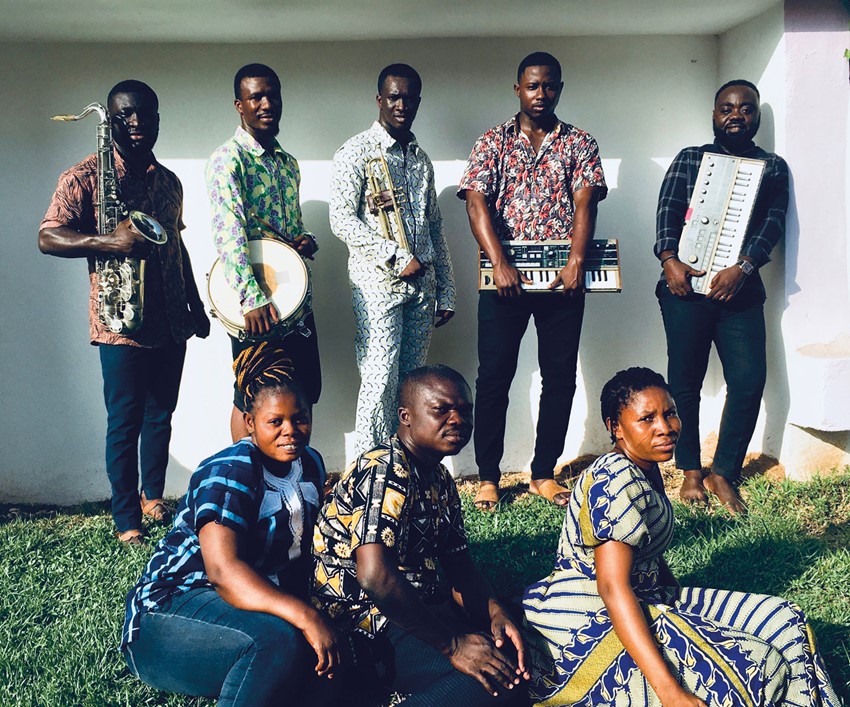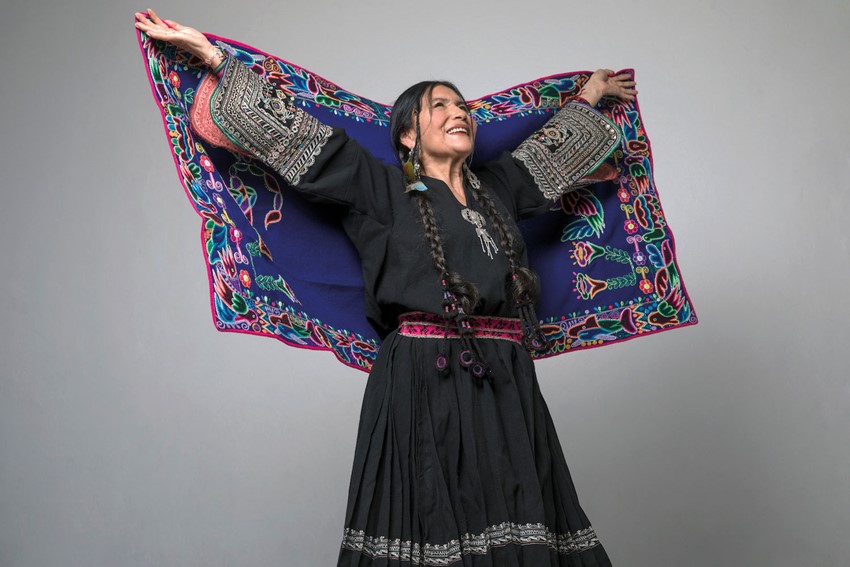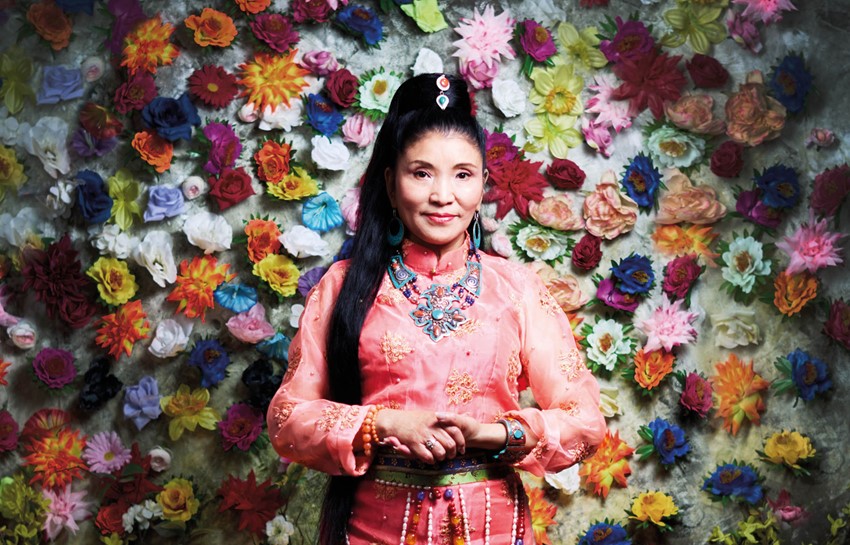SONGLINES MUSIC AWARDS
We are currently asking our readers to vote for what they think is the best album of 2024. To enter your vote click on the link below:
We are currently asking our readers to vote for what they think is the best album of 2024. To enter your vote click on the link below:
It’s time to reveal the winners of the 16th Songlines Music Awards. From Best Artist and Best Group, both chosen by our readers, to our regional categories picking out the best albums from around the world, and Best Newcomer, our accolade for a seismic debut, all chosen by our music critics, it’s been another stellar year of music-making.
Listen to our playlist of tracks from all shortlisted albums here:
These awards are for albums released in 2023 that featured in issues published between March 2023 (#185) and January/February 2024 (#194) – they deal with issues of resistance, home, unity, friendship and love, not to mention their displays of fine musicianship. As is our custom, we will be giving out our award for World Pioneer later in the year.

KahruMusiqa (Akuphone)
An album for the people, voted for by the people: KahruMusiqa by Tunisian singer-songwriter and composer Badiâa Bouhrizi, also known by her stage name Neysatu, is a collection of 12 mainly fushá (standard Arabic) songs written between 2004 and 2011 and recorded in Tunis, London, Paris and Montréal – each pulsing with compositional smarts and message-driven intention. Having grown up near Tunis singing in choirs and performing such classical Arabic musical styles as muwashshahat and ma’luf, Bouhrizi became a fixture of a music scene driven underground by oppression and repression. She fronted a heavy rock band, Black Angels, while still a teenager, and attended a Paris music conservatoire before resuming her place in a clandestine subculture where electronic beats were vehicles for activism as well as partying.
“In North Africa we express our pain through repetition and trance, exhorting the spirits of suffering… through music and movement,” says Bouhrizi, who discovered the liberating power of computer software via an early 00s encounter with Beirut producer Zeid Hamdan, and crafted electronic compositions that blended the two aesthetics. USBs containing Bouhrizi’s lo-fi works – also influenced by reggae, jazz, funk, neo-soul and Amazigh culture – were duplicated and passed around like contraband.
Tunisians gave Bouhrizi the title ‘Miltazema’ (Committed), a moniker granted to those committed to peace and justice. Her songs dovetailed with the collective mood: the beautiful, guitar-led ‘Labess’ became a live favourite during Tunisia’s short-lived Arab Spring, with Bouhrizi singing it at the 2011 Africa Celebrates Democracy concert in Tunis. ‘Bledi’, a tribute to her homeland, finds her sweet melisma belied by a lurching electro-creep, a sense of danger. ‘Manifesto’ tells of her rapper brother’s incarceration for his socio-political views. The award-winning ‘Ila Salma’ is dedicated to Palestinian resistance poet Fadwa Tuqan. An album to make you think as well as dance. Let this award spread the word. Jane Cornwell
Mari Kalkun – Stories of Stonia (Real World Records)
Lisa O’Neill – All of This is Chance (Rough Trade)
Tuulikki Bartosik – Playscapes (Efni Records)
Catriona Price – Hert (Orange Feather Records)

Lady Sings the Balkan Blues (Snail Records)
Bosnian sevdah band Mostar Sevdah Reunion released their debut album in 1999, so are celebrating their 25th anniversary this year. They’re important not just as one of the leading bands performing the distinctive Bosnian blues, but as the band that kick-started what’s become a significant sevdah revival. They formed, quite remarkably, out of the ruins of the Bosnian war and the divided city of Mostar – where peace is still uneasy to this day.
Over the years they’ve worked with Balkan legends like Šaban Bajramović, Esma Redžepova, Ljiljana Buttler and their original vocalist Ilijaz Delić, and also helped launch the wonderful Amira Medunjanin. Their current vocalist is Antonija Batinić, and her ‘stunning vocal style,’ according to the Top of the World review of their last album, Lady Sings the Balkan Blues, ‘blends traditional Oriental melismatic singing with a kind of rockier, groovier sensibility.’
MSR have shown that Bosnian sevdah is not only popular throughout the Balkans, but in the wider world as well. Yet it remains very much a product of the Turkish and Islamic histories that are such distinctive parts of Bosnian culture. The current band – with just a couple of the original members – have a slightly more jazzy flavour with the piano of Gabrijel Prusina, although the violin of Ivan Radoja adds an earthy lyrical intensity. Recorded in Mostar’s Pavarotti Music Centre, tracks like ‘Mene Majka Jednu Ima’, ‘Srdo Moja’ and the perennial ‘Moj Dilbere’ have a beautifully dark confessional quality. Simon Broughton
Tamsin Elliott & Tarek Elazhary – So Far We Have Come (Penny Fiddle Records)
Tinariwen – Amatssou (Wedge)
Orkestra Shkodra – Like Nightingales in the Spring (Oda 3)
Samaïa – Traversées (Samaïa)

Alogte Oho & His Sounds of Joy (photo: M Weissenfeldt)
O Yinne (Philophon)
Alogte Oho was a struggling singer attempting to make his name among the Frafra people of northern Ghana when he was knocked off his motorbike and was fortunate to escape with his life. During the month he spent recuperating in hospital, he wrote the song ‘Mam Yinne Wa’ (God, You Love Me So) to thank his maker for his survival.
Once recovered, he recorded the song, which became a local hit, which is how the producer Max Weissenfeldt of German funksters The Poets of Rhythm heard it in 2014 when he stepped off a bus in the Frafra market town of Bolgatanga. Impressed by Alogte’s voice as ‘Mam Yinne Wa’ blared out of speakers all over town, he tracked down the singer and re-recorded the song for international release as a 7” on his Philophon label. Further singles followed and in 2019 an album, also titled Mam Yinne Wa. A rich highlife and gospel mix, it led to a WOMEX showcase and European tour.
In 2023 came a second album O Yinne!, recorded mainly in Weissenfeldt’s studio in Kumasi, the former capital of the Ashanti kingdom deep in the tropical rainforest. Backed by Alogte’s female backing choir the Sounds of Joy, featuring Lizzy Amaliyenga, Patricia Adongo and Florence Adooni, it’s a joyous Afro-futuristic fusion of rolling traditional highlife rhythms with a thrillingly contemporary electric slant and dashes of Afrobeat, reggae and Ethiopian pentatonics, bolstered by the Finnish musician Jimi Tenor on saxophone and flute. Nigel Williamson
Balimaya Project – When the Dust Settles (New Soil / Jazz re:freshed)
BCUC – Millions of Us (On the Corner)
Ndox Electrique – Tëd ak Mame Coumba Lamba ak Mame Coumba Mbang (Les Disques Bongo Joe)
Nihiloxica – Source of Denial (Crammed Discs)

Luzmila Carpio (photo: Nora Lezano)
Inti Watana: El Retorno del Sol (ZZK Records)
At rare times, an album, an artist and a history combine to produce something very special. So it is here with Inti Watana: El Retorno del Sol by the Bolivian singer, songwriter and activist Luzmila Carpio: a sublime work which manages the almost impossible trick of sounding at once traditional yet thoroughly up-to-date, thrillingly experimental but effortlessly captivating. A concept album centred on the idea of spiritual communion with nature, the record feels (and sounds) like the ultimate expression of its maker’s life.
Born in the small town of Qala Qala, in the Department of Oruro, west of Bolivia, in 1949, from an early age Carpio found herself butting heads with an establishment which stigmatised the culture of the country’s Indigenous people. It was a time when Spanish-language music was dominant, urban living was promoted as the progressive way of life, and deep-rooted misogyny permeated society. Carpio took the brave step of challenging the status quo on all three fronts, succeeding in establishing herself as a renowned solo female artist. Eschewing the popular songs of the day, she turned away from urban hipness to embrace her native ancestry, composing folk numbers and children’s songs in the Quechuan language. She was appointed as an official ambassador to France for Bolivia between 2006 and 2010.
All her adult life, Carpio has devoted herself to championing the rights of women, Indigenous people and the land itself. Inti Watana: El Retorno del Sol stands as a beautiful testament to her work. Chris Wheatley
Rhiannon Giddens – You’re the One (Nonesuch)
Son Rompe Pera – Chimborazo (AYA Records)
Soema Montenegro – Círculo Radiante (Mais Um)
Lucas Santtana – O Paraíso (NØ FØRMAT!)

False Lankum (Rough Trade Records)
It’s predictable, we know. But, in all its doom-laden glory, False Lankum deserves the mass attention it continues to receive.
Not least for the concerned, depressed existentialism that it so powerfully captures. Radie Peat’s startling, thin and forceful voice opening on ‘Go Dig My Grave’ tells the tale of a woman asking to be cared for in death as she wasn’t in life. And the near-13-minute epic, ‘The Turn’, closes, with Daragh Lynch, Ian Lynch, Cormac MacDiamarda and Peat in tight vocal harmony, half-pleading, half-asserting, ‘We’ll find better days.’
But part and parcel of False Lankum’s darkness is a plain love – for people and for music alike. In ‘On a Monday Morning’, a lament for the start of the work week, Ian Lynch sings, ‘My lover is warm and her heart is mellow,’ a desperate sigh, then simply, ‘I’d trade you the world just to share her pillow… on a Monday morning.’ ‘Master Crowley’s’ is a jig that uplifts and breathes. Bathed in low drones, the melody seems to dance playfully around the corners of an abandoned building, in and out of hearing between industrial bangs, in an expression of Lankum’s own exploration.
In all of this, False Lankum takes its time. There is no rushing through. ‘Clear Away in the Morning’ begins with 40 seconds of dissonant reverb and ‘Fugue I’, ‘II’ and ‘III’ provide bridges between the album’s four sections, forcing one to sit, to savour the music, the sounds, the senses as they should be savoured. Emma Rycroft
Brìghde Chaimbeul – Carry Them With Us (Glitterbeat Records)
Mari Boine & Bugge Wesseltoft – Amame (Norse)
Catrin Finch & Aoife Ní Bhriain – Double You (bendigedig)
Rodrigo Cuevas – Manual de Romería (Sony Music)

One Drop of Kindness (Real World Records)
More than anything else – more than her music, a trad-modern mix of sung prayers and Western and Eastern instrumentation, or her voice, whose long, sustained notes are known to bring birds to roost in trees, the Tibetan singer Yungchen Lhamo is driven by a wish for universal compassion. By the need to transmit the conviction that together we can make a difference, just by tweaking our attitudes. Her album, One Drop of Kindness, is testament to a philosophy this serene, otherworldly figure embodies as a lifestyle.
“Just one act of kindness can change a life,” says Lhamo, who in 1989 fled Chinese-occupied Tibet on foot for Dharamsala. She relocated to Sydney, Australia, where her debut Tibetan Prayer won an ARIA, catching the attention of UK-based Real World Records. 1996’s Tibet, Tibet opened with ‘Om Mani Padme Hung’, Tibetan Buddhism’s mantra of compassion. Producer Hector Zazou multi-tracked her voice and included the chants of Tibetan monks on 1998’s Coming Home, and Lhamo’s fame grew.
She didn’t want it; not really. Not unless it served her goal. In 2004 she founded the One Drop of Kindness Foundation, and from her current base in Kingston, upstate New York, went on to eschew the limelight, spending a decade working with marginal communities at homeless shelters and at her home.
Produced by Greek-Californian John Alevizakis, Lhamo’s current seventh album showcases a voice even richer, and more powerful, than before. Sung in Tibetan, titled in English, all seven tracks speak to the theme of the album’s title while variously incorporating the groove and excitement of Middle Eastern and West African rhythms, the loops and spirals of trance and the beauty of vocal waves that continue to astound.
“We need to look after each other,” she says. “Together, drop by drop, we can change the world.” Jane Cornwell
Debashish Bhattacharya – The Sound of the Soul (Abstract Logix)
Aditya Prakash – ISOLASHUN (New Amsterdam Records)
Alam Khan, Arjun K Verma & Del Sol Quartet – The Resonance Between (Six Degrees / AMMP)
Batsükh Dorj – Ögbelerim (Buda Musique / Routes Nomades)

Kayhan Kalhor & Toumani Diabaté (photo: Andy Spyra)
 Kayhan Kalhor & Toumani Diabaté
Kayhan Kalhor & Toumani DiabatéThe Sky is the Same Colour Everywhere (Real World Records)
The Sky is the Same Colour Everywhere was described in our Top of the World review as ‘almost an hour of spontaneous stringed magic.’ Both Kayhan Kalhor, the leading spike fiddle player from Iran, and Toumani Diabaté, the leading kora player from Mali, have done numerous collaborations, but this Iran-meets-West Africa project was a first for them. The bowed kamancheh (although Kalhor frequently plucks his instrument) and plucked kora weave around each other creating a continuously evolving tapestry. “Toumani and I come from different places but are producing one thing – united rather than divided,” says Kalhor. “We are all living in the same world. That is the message.”
The two musicians came together in 2016 at the Morgenland Festival in Osnabrück, Germany, which specialises in new collaborations like this. They had no preparation except for a sound check and the piece evolved spontaneously. Both performers come from musical cultures where improvisation plays a major role, and that is clearly why it works so well and sounds so organic. The recording was made in Paris after a handful of concerts following on from Morgenland; the improvisatory feeling is still fresh.
The Sky is the Same Colour Everywhere takes its title from the poem ‘Ballad of the Wayfarer’ by Iran’s Mehdi Akhavan-Sales (1929-1990). With migration an increasing problem in the world, the idea of being united rather than divided is increasingly important. Toumani says: “Kayhan and I may be from different countries, but we’re coming from the same place.” Simon Broughton
Arooj Aftab, Vijay Iyer & Shahzad Ismaily – Love in Exile (Verve Records)
Dele Sosimi & The Estuary 21 – The Confluence (Wah Wah 45s)
African Head Charge – A Trip to Bolgatanga (On-U Sound)
Meral Polat Trio – Ez Kî Me (Meral Polat Records)

SIM SIM SIM (Mr Bongo)
Bala Desejo came as a surprise to more than just their audience. The group of school friends, Julia Mestre, Dora Morelenbaum, Zé Ibarra and Lucas Nunes, moved in together during lockdown without much thought as to the music that might come out of it. After a few months, however, a band was formed. And after some fan-garnering performances, a recording opportunity was secured. The resulting debut, SIM SIM SIM, is a smooth, grooving, tropicália, MBP and jazz-flecked delight. The friendship between all four band members diffuses warmly through the close harmonies, playful chatter and balanced instrumentation. What’s more, it’s consistent: each of SIM SIM SIM’s 13 tracks offers something distinct, shining a light on a new aspect of the group’s musicality – whether it’s Mestre and Morelenbaum’s close harmonies in conversation with Ibarra’s soft voice in the funk-riddled ‘Lua Comanche’; the reggae-esque guitar and soaring brass of ‘Clama Floresta’; the jazz-samba-dance anthem of ‘Dourado Dourado’; the be-bopping, 60s pop joy of ‘Lambe Lambe’ or the enigmatic, mischievous whispers of ‘Sim Sim Sim’.
Since the release and acclaim of this album (which won a Latin Grammy), the band have gone on to tour internationally, taking their sound everywhere from Japan to Germany, with a short stint in the UK. In between, members have been taking time to focus on different projects, too: Julia Mestre recently released the more pop-oriented ARREPIADA; Zé Ibarra released a solo album, Marquês, 256, in 2023 and is now preparing for the release of Hoje, Ontem with his band Dônica; and Morelenbaum saw her solo EP Vento de Beirada get a much-deserved international release in September last year.
After announcing a farewell tour this year, Bala assured their fans it was the album they were saying farewell to, and not the group. On Instagram, they wrote, ‘SIM SIM SIM says goodbye to the stage, but not Bala, Bala goes beyond the album, Bala continues… Now it’s time to celebrate and end [the SIM SIM SIM tour] with a flourish.’ The multi-talented group, and the individuals that make it up, are surely going to continue to pique our ears and interest in the year(s) to come. Emma Rycroft
Start your journey and discover the very best music from around the world.
Subscribe